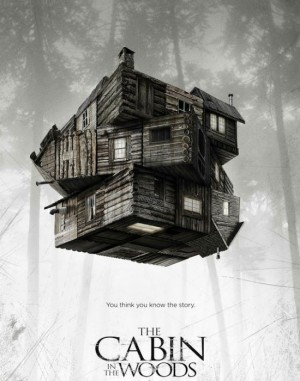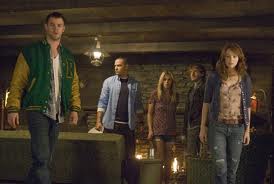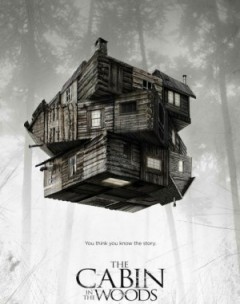
The Cabin in the Woods is a supernatural genre-bender penned by Joss Whedon and Drew Goddard. It is a bizarre story that grows odder as it goes, but there is a focus on character, a decent atmosphere, success in keeping a young and handsome cast from becoming mere plastic eye candy, some intelligent dialogue and a few inspired approaches to scenes. There was enough skill involved in its creation to make a fine work. It had me at the opening; it kept me as events unfolded; it lost me at the end.
To summarize the plot past a certain point is to risk ruining a first viewing. At the beginning, five college students go to a cabin in a woods to spend a weekend drinking, playing games, and committing acts that many religions proscribe outside of matrimony. It is safe to share that the students are being monitored and manipulated, because this aspect is revealed from the outset. From the conversations of the monitors we piece together that the students are going to be put through some sort of gruesome trial, and that these students will, unwittingly, determine the nature of that trial. Beyond that I prefer to say only that beneath this bizarre surface is a whole lot more story to be uncovered.
There are a number of things the movie gets right. Despite the fact that the nature of the cabin is explained early on, there is still a mood of enigma about everything. The monitors become the mystery, rather than the cabin. The dialogue, despite Whedon’s continuing penchant for corny one-liners at the wrong moment, is streamlined, full of character, and delivers just enough information without talking directly to the audience. Tantalizing phrases suggest a deeper plot, hints of which are continuously doled out to us. Even one aspect that seemed initially disappointing, regarding the trite order in which characters must die in a horror movie, is given a surprising yet sufficient explanation later on.
The script demonstrates thoughtfulness in the way it approaches things. There is a basement that figures large in the story, but the way Whedon and Goddard get the kids in the basement is imaginative. They are playing a game of truth or dare, and when it is the turn of the less sexually adventurous of the two girls, another character ventures her answer for her: truth. She gets irritated when he explains that whenever she chooses dare she always goes back and says she would rather do truth. To show him up, she reluctantly picks dare, but the game is interrupted by the discovery of the basement. After staring into the dark depths for a while, the other players decide that the girl’s dare will be to explore the basement.

I had a handful of minor issues, many of which might be cleared up on a later viewing. However, at this point they seem illogical and contrived. By way of example, there is a one-way window between two bedrooms. On one side, it is a mirror, on the other side translucent glass, but it is covered by a painting. One of the boys removes the painting due to its macabre subject matter and gets a view into the room of one of the girls. She starts to undress and after a quick debate, he tells her to stop and shows her the mirror.
As far as I can tell, there is no logical reason for the one-way mirror to be there. Because the nature of the trial awaiting the lodgers is to be determined, one might argue that the mirror is there in case a particular trial is chosen, but I feel like that gives a free excuse card to the screenwriters for any implausibility they stick in the movie. Either the students should have encountered something in the cabin that would have to do with the particular trial they end up with, or they should have discovered all sorts of architectural and decorative oddities that would at first baffle the characters but whose use the audience could guess at (they do find in the basement many items, each relating to a different scenario, but this is not what I am referring to). As it is, the mirror, chilling though it is when first discovered, ultimately feels like a convenience to help show the chivalrousness of one of the male roles, who will soon become an amorous interest of the girl on the other side of the mirror.
Notwithstanding the few minor issues, I was sold from the beginning until near the end, whose nature I prefer not to describe here. Suffice it to say that it goes from bizarre to outlandish, and does it in a very short period of time. Where before mystery had been heightened and questions answered at a judicious pace, now everything started spilling out all at once, while I felt there was still more mystery and revelation to tease us with and plenty of time to do it. Restraint is cast aside in favor of slapping the viewer over and over with excess, and the final effect is a silliness that does not sit well with the established tone.
A moviemaker should, to my way of thinking, treat the viewer like a woman. He must court her, slowly, never pushing too far but neither missing an opportunity to advance his cause. Whether the courting takes place over a month or single evening, there is a pace she will accept and a pace that will lose her favor. It is different with every woman, but there are certain approaches that work with none of them. If you find the pace and approach that makes her eager, she very well may, to borrow a phrase from Dangerous Liaisons, perform quite eagerly acts that one would hesitate to ask from a professional. But you cannot whip out your manhood in the restaurant over dessert. That would be revealing too much too soon, and that is precisely how the last act of the movie felt.
The Cabin in the Woods is worth seeing for its uniqueness, and it certainly is not a bad movie. I was considering adding it to my collection until the last part made my decision easier. A $10 movie ticket might be too much for some, but a Netflix rental does not seem like a bad idea, especially for one who likes supernatural horror and a little genre-bending.















